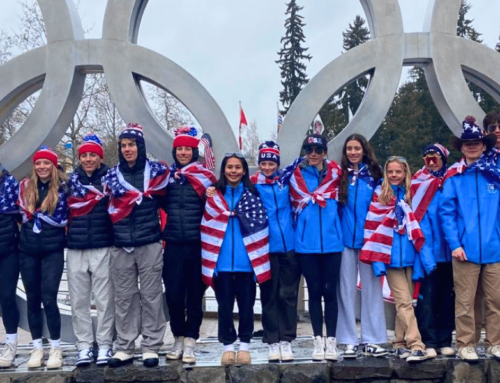Rolf Gidlow: Remembering ski racing’s cosmic gift to coaching
Rolf Gidlow: 1952-2022
In 1991, Rolf Gidlow rolled into Burke Mountain Academy from Minnesota in his old Volvo wagon. He brought ten years of coaching experience, a carful of literature, poetry and music books, and a boatload of intellect and curiosity. The trained concert pianist had been drawn to Burke by Warren Witherell’s iconic ski coaching books but mainly by the values upon which the school was built. Values that supported the healthy convergence of athletics, academics and community. In 40 years of coaching, Gidlow championed those values daily.
Gidlow passed away from cancer on June 16, 2022. At a celebration of his life at Stratton Mountain School on July 1, Burke Mountain Academy Headmaster Willy Booker drew on memories and stories from a wide swath of “Rollie’s” former athletes and colleagues, summing up his particular magic as: “John Wooden, John Lennon and Yoda all mixed up in a cosmic package that manifested itself in this quiet, sage presence.”

Lingelbach’s first memories
Bruce Lingelbach was a coach at Burke when Gidlow arrived and remembered thinking this new guy seemed better suited for the Classics Department at Stanford than the coaches’ office at BMA. “You could tell right away he was a different cat,” recalls Lingelbach.
The two would coach J1 girls together that season. Lingelbach immediately noted his colleague’s encyclopedic knowledge of hundreds of ski racers and his ability to pick out and address only the technical things in an individual’s skiing that were achievable and would have the most significant impact. If he had them, his twin mantras might have been “keep it simple” and “work with what you’ve got.”
Rather than try to shape athletes into one mold, Gidlow saw the value of individuality, including his own. Rolf and his wife Kasey were together for nine years, and Kasey adopted his approach in their relationship. “I learned quickly to embrace his quirks rather than try to change them,” says Kasey. Similarly, Lingelbach soon saw that Gidlow’s genius lay in his incongruity. “Rolf was a rich asset precisely because he didn’t fit the mold.” There were plenty of mainstream ski coaches around, but there was only one Rolf!”

Humble and quiet man praised
At the heart of the memories and tributes that flooded social media after his passing (despite Gidlow’s near-legendary quest for anonymity) were words like kind, patient, quiet, thoughtful, compassionate, artistic, cerebral and brilliant. Gidlow was all that in an unassuming package. While the ski racing environment tipped relentlessly closer to the high end of the spectrum in terms of speed, pressure, intensity and emotion, Gidlow offered an oasis of calm and a license to turn down the volume.
Gidlow’s relationships started with a profound connection to each athlete, achieved by steadfastly resisting the natural institutional inertia to prescribe a one-size-fits-all approach. Gidlow coached Fredi Schneider for his four years at Burke, and Schneider points out that Rolf’s belief in his athletes empowered them with confidence in skiing and life. “He never asked more of us than we could do,” says Schneider, “because he believed in us so much.”
Colleagues express respect for Gidlow
In his Facebook post, Chip Knight, now USSS Alpine Development Director, described Gidlow as “a Renaissance coach, with interests stretching from sports to music to literature and poetry to history and politics” and cited his ability to use those subjects to reach and inspire young people. Said Knight: “He treated his athletes with a kind of respect that few adults give teenagers.” High expectations and a great deal of trust proved a powerful combination. Two of Rolf’s athletes qualified for the World Junior Championships in 1993, including Knight, who won slalom gold with Gidlow at his side.
Ski racing is notorious for inflated egos; however, Gidlow bore the most precious gift of all: humility. Gidlow was named US Domestic Alpine Coach of the Year by the USSA in 1993, an honor Rolf’s sisters first learned of at his memorial.
At one point in his career, the US Ski Team invited Gidlow to become a member of their staff. By then, Lingelbach was a US Ski Team coach and recalled attending spring meetings. One morning he walked out of the hotel and saw Rolf sitting with his bag on a bench in the valet turnaround. “Going home?” Lingelbach ventured. “Yep.” And that was that. If the jacket didn’t fit, Rolf wouldn’t wear it. He fundamentally belonged in the trenches of Vermont.
Staying true to his beliefs
From his ten years at Ski Hut in Minnesota, throughout his 22 years at Burke and four each at GMVS and Stratton, Gidlow coached men and women from U-16 through FIS. “He had ideas and hoped that his methods were respected, but he never wanted to push them on anyone,” says Kasey. He also didn’t shy away from voicing disagreement or opposing groupthink when he saw adults stepping in to supersede a program’s proper focus. As Booker described Gidlow’s worldview, “Specifically, he identified with the idea that you could cultivate an environment where teenagers are trusted, treated with mutual respect, and given agency over their learning.”

Gidlow encouraged kids to go after ski racing with a passion and pursue other interests. He suggested books or music that would stoke their curiosity and intellect while helping them conceive of the unlimited possibilities in their futures beyond ski racing. In this, too, he led by example. A fixture on piano at any gathering that accommodated it, a dozen years ago, Gidlow also dove headlong into Irish music. To pursue his interest, he needed a travel-friendly instrument and took up the concertina, a small accordion-like instrument used for traditional music. He also sought out the instrument’s preeminent master, Noel Hill, in Ireland, and set about transcribing his tunes into sheet music, all by ear, and, of course, befriended him. It was further proof that one could strive towards disparate, satisfying goals without detracting from either.
Gidlow lived with cancer
In the spring of 2019, one month after retiring from ski coaching, Gidlow received a stage four prostate cancer diagnosis. He approached this challenge in his typical measured and patient way. His body responded to treatment and his trademark optimism allowed him and Kasey to enjoy two fun, active years golfing, skiing, snow-shoeing and immersing himself in his music projects. As if proving his counsel to so many athletes, his life beyond ski racing was indeed whole and rich.

Scott Burns remembers the gift Rolf gave him at his high school graduation, and to Kasey, it signifies the sense of possibility Rolf most wanted to pass along to those he touched. In giving Burns the complete lyrics of Bob Dylan, he said: “Scott, Maybe this will inspire you to paint your masterpiece.”
His optimism remained when Gidlow’s cancer returned last fall and the battle began in earnest. In early June, Schneider, along with former teammates Kai Horwitz and Will Beney, took a road trip to see Rolf, the coach who “got” them like no other. It was the last time Rolf would go outside. He passed away five days later. “Their visit was the greatest gift of all,” says Kasey.





















